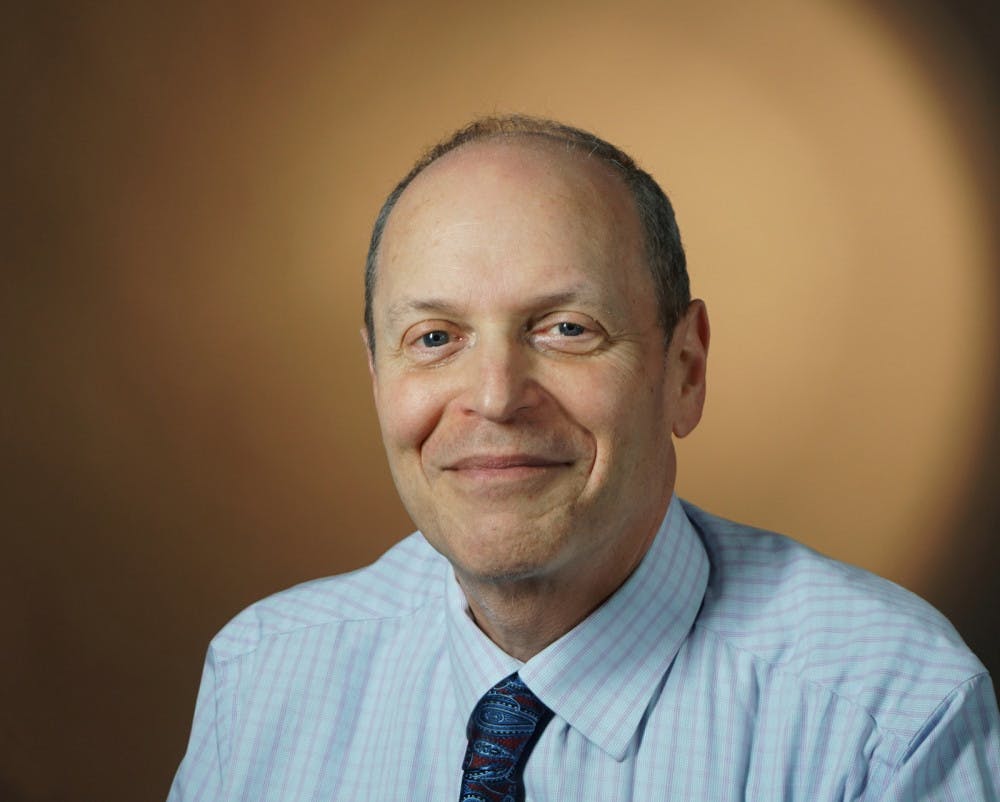Things change fast in the news business. Alan Rosenberg knows this better than most.
In his nearly 43-year career at the Providence Journal, Rosenberg has seen changes big and small. He saw journalism shift online in the mid-2000s. He was there when the Journal was purchased by then-publishing giant GateHouse Media in 2014. He was there (and is still) during the COVID-19 pandemic. And he has seen many of his colleagues forced to leave the Journal as the paper’s circulation has shrunk.
Rosenberg has seen his fair share of personal change within the Journal as well, taking on new positions many times within the paper. His last career change was assuming the role of executive editor in May 2017, the pinnacle of a career spanning more than four decades at the Providence Journal.
Next month, Rosenberg will change things again: He announced Nov. 13 that he would retire from the Journal, accepting a buyout from the paper’s owner, Gannett, which is the largest newspaper publisher in the country by total daily circulation.
Many of the changes in Rosenberg’s career were unexpected. He was first approached about his ultimate position by former Executive Editor Dave Butler before Butler’s retirement. Butler took him out to lunch and asked him, “Have you ever thought about running this place?”
“No, I haven’t,” Rosenberg recalled responding. The question caught him off guard because he thought of himself as a “features guy” — he had spent 24 of the 29 years prior in the features section.
At the beginning of his career, Rosenberg didn’t plan to stay at the Journal for longer than five years. He dreamed of prestigious legacy papers such as the New York Times or his hometown papers in Chicago. Things changed when he met Avis Gunther, a young woman from Cranston, whom he would one day marry.
His put his job search on hold, where it would stay for decades. Telling the story, he couldn’t help but grin.
According to Rosenberg, many of his moves from position to position within the Journal were simply offered to him. “We think you would be good at this,” editors would say to him. He did not seek out new roles — the paper’s leadership came to him.
His retirement was also unexpected. In October, Gannett announced a round of voluntary buyouts for its staff of over 250 newspapers. About 500 of Gannett’s 21,000 other employees — 5,000 of whom are journalists — are also taking the deal.
The buyout was generous, Rosenberg said. He considered his age and if he could afford to retire. “I did the math,” he said, and the math told him to take the deal, to make a change.
Because the decision came suddenly, Rosenberg does not know what he will do after his final day at the Providence Journal Dec. 1.
“I've always been open to what the universe is bringing me,” Rosenberg said. “And so far, it has worked well for me.”
Change as Executive Editor
During Rosenberg’s tenure as executive editor, he took it upon himself to change the way the Journal connects with its readership.
In a column titled “As new executive editor, let me say hello,” published shortly after he was chosen for the position, Rosenberg introduced himself to readers. He welcomed a new dialogue about the paper’s coverage.
“We’ve tended to be a quiet bunch here on Fountain Street, but the days when we can simply put our work on our pages and expect it to speak for itself are long gone,” Rosenberg wrote.
In retrospect, Rosenberg said he always thought the Journal should change what he called a “stiff-upper-lip approach to the rest of Rhode Island.” The paper often had a “never explain, never complain” attitude, he said. Rosenberg said that approach has been out of step with the times for a while now.
In sum, Rosenberg feels like he has delivered on his promise of open communication. He began writing weekly columns — an unprecedented duty for the Providence Journal’s executive editor — almost by accident. He kept having something to write about week after week, Rosenberg said, until it became a regular task.
In his columns, he explained what changes were being made in the paper’s coverage. Even the little things matter: He wrote one column explaining how the paper tries to balance coverage of the University of Rhode Island’s and Providence College’s basketball teams, a longtime rivalry.
He heard back from readers as well. They told him what they thought the Journal should be covering, and what they thought the paper had gotten wrong. After Rosenberg announced his retirement, some readers reached out to say that they didn’t always agree with him, but they did think he was sincere.
As local journalism struggles around the country, Rosenberg said that connections within the community have become crucial. “The main thing you are selling is trust,” he said, “and your reputation for truth and probity.”
The COVID-19 pandemic made connecting with the community even more difficult for Rosenberg and the Journal. Not only were reporters mostly working from home, but Gannett required that all of its newspaper staff take one week of furlough per month until July. So, the Journal was covering a huge story with one hand tied behind its back.
When one reader wrote in to the Journal to point out an error, adding a complaint about “the complete lack of effort that is considered ‘news,’” Rosenberg wrote a column defending the newsroom (which had gone remote). They had continued to put out a daily paper despite a scattered and reduced staff.
Rosenberg said that his furlough weeks were bizarre for him. He had taken vacation while at the paper, but the work didn’t really stop when he was away. “Today, there’s no off duty,” Rosenberg said, adding that he often finds himself checking his email and voicemail four or five times an hour when he’s home. But on furlough, he was forbidden from doing any kind of work at all.
To his surprise, Rosenberg was not bored with his down time. “It’s kind of nice,” he said. “Who knew?” His weeks of furlough turned out to be a “dress rehearsal for retirement.”
Still, Rosenberg found himself missing the buzz of the newsroom. He has spent most days of his 43-year career around people in the office — colleagues sitting next to him and behind him, people making phone calls and tapping on keyboards. His face lights up when he talks about the feeling when news breaks, and everyone scrambles to tackle a different task.
It makes him sad to think about never having that experience again.
Rosenberg knows that his successor will face the challenges of a remote newsroom, where building camaraderie is difficult. He thinks keeping reporters and photographers safe — both from COVID-19 and a world that is increasingly hostile to journalists — will be another challenge.
But Rosenberg is not worried about change as a result of his departure.
During his time at the Journal, Rosenberg has seen many journalists come and go. He has learned that change is always unsettling and scary. “We experience change as loss,” he said, and most people think that the status quo is the way it should be.
Change, Rosenberg added, is natural. “We don't get to stand still in our lives.”

Ben Glickman is the 132nd editor-in-chief and president of The Brown Daily Herald. He previously served as a metro editor and oversaw the College Hill and Fox Point beat, in addition to writing and editing about city politics, COVID-19 and the 2020 election. He is the co-creator of the Bruno Brief, The Herald's first news podcast. In his free time, he is passionate about birds (also tweeting) and eating way too spicy food.





